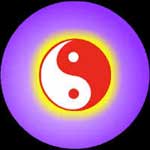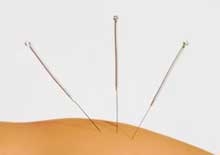by Beth Kohn, L.Ac., MTOM, Dipl. Ac., Dipl. CH
Henry Ford Center for Integrative Medicine
Editors Note: Michael Seidman, MD, Director of the Tinnitus Center at Henry Ford Health System is an ENT physician and considered one of the foremost authorities on tinnitus in the US. He employs a variety of medical and herbal therapies for his tinnitus patients, including Arches Tinnitus Formulas. He refers many of his patients who do not respond to these therapies to the Center for Integrative Medicine (CIM) at Henry Ford, of which he is also the director. The Center employs therapies drawn from the best of the world’s healing traditions to help patients achieve overall wellness and optimal health. Guest author Beth Kohn is a licensed therapist at CIM.
 Acupuncture and Tinnitus
Acupuncture and Tinnitus
Tinnitus is often a very frustrating health problem for many people. Patients often feel discouraged after many doctor visits and drug therapies fail to make even the slightest difference. This leads many to try a more “alternative” approach and be pleasantly surprised at the results.
Traditional Chinese Medicine (TCM) encompasses Acupuncture therapy, Chinese diagnostic techniques and herbal therapy. Practitioners of TCM often incorporate diet and lifestyle changes to help patients resolve many of their health concerns. Many patients respond well to a course of treatment that includes a combination of acupuncture, herbs and lifestyle changes. Tinnitus is one such condition.
While it is difficult to explain all of the complex subtleties and specifics of this ancient healing system in a few words, it is simple to say that this is a medicine based on the understanding that we have a vital life force in our bodies. This is referred to as “qi” (pronounced chee), or energy and it helps to fuel the many functions of the body, ie: digestion, elimination, reproduction, etc. This energy travels along pathways in the body known as meridians. When there are imbalances in this energetic system, they often manifest as symptoms such as illnesses and pain.
Along with the “qi” of the body, there are two other components which must balance and which relate to our wellness. These are substance and function elements of the body known as “yin” and “yang”. Yin substances are represented in the body by things like blood, mucous, synovial fluids; substances that moisten and lubricate the body. Yang refers more to function such as peristaltic action, digestion, elimination. While they are complimentary opposites by their nature, they very much rely on each other to maintain good health. When the delicate balance of these two components is upset, we also begin to see symptoms.
 Tinnitus is often an example of an imbalance between yin and yang. For many people, their tinnitus is an expression of a much deeper disharmony that has been slowly and gradually evolving. For these patients, the treatment options will include acupuncture and herbal therapies to nourish the body at a deeper level. For others, tinnitus may be a result of side effects from medications or exposure to loud noise. These patients may respond well to acupuncture therapy alone.
Tinnitus is often an example of an imbalance between yin and yang. For many people, their tinnitus is an expression of a much deeper disharmony that has been slowly and gradually evolving. For these patients, the treatment options will include acupuncture and herbal therapies to nourish the body at a deeper level. For others, tinnitus may be a result of side effects from medications or exposure to loud noise. These patients may respond well to acupuncture therapy alone.
TCM addresses not only the symptom (which we refer to as the branch), but the underlying imbalance (called the root). By treating this way, we are able to break a cycle of disharmony to support the body in its return to optimal health. This expresses the practice of preventative healthcare.
One of the most common patterns associated with tinnitus deals with a “yang rising” or upward flaring of the fire energies in the body. This is often coupled with a “yin deficiency” pattern as the deeper root. The depletion of yin creates a situation in which the yang or fire energy is more prevalent- and the delicate balance is disrupted. The combination of the upward flaring heat and the deficiency in the cooling aspect can be expressed by a variety of symptoms such as ringing in the ears, dizziness, dry or burning eyes and irritability. This pattern is often related to two specific energy systems called the Kidney meridian and the Liver meridian. These names are referring to pathways of energy, not to the western organs of the kidney and liver. Patients with these imbalances may also have other related symptoms such as low back soreness or pain, knee pain, poor vision, headaches, or night sweats just to name a few. A TCM practitioner will further identify what meridians are involved and will tailor treatment towards re-establishing the balance that the body needs to heal.
In determining a TCM diagnosis, all aspects of a person’s health are considered. A practitioner will perform a complete health history and will also use diagnostic methods specific to Chinese medicine to better understand what is out of balance in the system and how to approach treatment. This includes assessing the patient’s pulses and looking at the patient’s tongue. The pulses reflect the current state of energy related to the meridians in the body, and the tongue gives the practitioner information about fluid balance, digestive health and heat in the body. All of this information is synthesized into a TCM diagnosis and the treatment plan is set.
 Acupuncture therapy uses very fine, thin needles that are gently inserted into the skin. The needles are approximately 10 times thinner than a standard hypodermic needle and the treatment is painless and safe. One of the most wonderful “side effects” of all acupuncture treatments is relaxation. The body has a natural healing response to the acupuncture in which endorphins (relaxation chemicals) and enkephalins (pain relieving chemicals) are released into the body. There is no medication in the needles. Patients feel a true sense of wellness and relaxation as a result of this natural body response.
Acupuncture therapy uses very fine, thin needles that are gently inserted into the skin. The needles are approximately 10 times thinner than a standard hypodermic needle and the treatment is painless and safe. One of the most wonderful “side effects” of all acupuncture treatments is relaxation. The body has a natural healing response to the acupuncture in which endorphins (relaxation chemicals) and enkephalins (pain relieving chemicals) are released into the body. There is no medication in the needles. Patients feel a true sense of wellness and relaxation as a result of this natural body response.
Chinese herbal formulas have ingredients that are plant, animal and mineral based. A practitioner will take into consideration other medications that the patient is taking when deciding on an herbal course of care.
Chinese Medicine has an extensive history and has been practiced for over 4000 years. Each person is unique and will have an individual response to treatment. Some patients will respond more quickly to care, while others may need to be more patient with their healing time. Chinese medical practitioners recognize this uniqueness and work to support each patient’s own healing journey.
Looking for an acupuncturist in your state?
http://www.acufinder.com/
About the Author:
Beth Kohn earned her Masters Degree in Traditional Oriental Medicine through the Pacific College of Oriental Medicine in San Diego, CA. She is a Licensed Acupuncturist in the state of California, and nationally certified in Acupuncture and Chinese Herbology. During her training, Beth treated patients at San Diego Hospice as well as patients serviced through the First Lutheran Church clinic. After working with patients in her private practice, she relocated to Manhattan New York to work as part of a multi-disciplinary team in a Physical Medicine Rehabilitation Center. While in New York, she received additional training in Acupuncture for the treatment of addiction at the Lincoln Recovery Center in the Bronx, NY. She was also a volunteer providing acupuncture care to the FEMA workers during the 9-11 rescue and recovery efforts. Beth enjoys educating and working with patients to help them achieve wellness. She uses Traditional Oriental Medicine to help patients with a variety of health concerns such as women’s health issues (menstruation, infertility, menopause, etc), acute and chronic pain, digestive disorders and chronic diseases (hepatitis c, fibromyalgia, and tinnitus).
